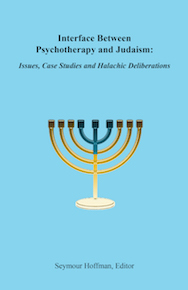
Interface Between Psychotherpy and Judaism: Issues, Case Studies and Halachic Deliberations
This Reader focuses on the interface between psychotherapy and Judaism. The twenty-one articles (with one exception) that were authored by orthodox and haredi rabbis and mental health practitioners are varied and relate to theoretical as well as practical issues. The book is divided into three parts- Issues, Case Studies and Halachic Deliberations. In the first part, issues such as attitudes of ultra-orthodox rabbis to psychological treatment, unique challenges in treating haredi patients, and relationship between rabbis and psychologists are analyzed and discussed among other topics. Part two presents case histories of the treatment of haredi and religious patients which include the participation of rabbis in specific situations and charming anecdotes demonstrating the psychological wisdom, sensitivity and insights of ancient and contemporary Jewish sages. Part three contains responsa of respected contemporary arbiters to questions raised by religious psychotherapists and articles discussing the relevant and sensitive issues of cross-gender therapy and honoring abusive parents by mental health practitioners. The appendix contains three articles in Hebrew discussing ethics of a religious therapist, rabbis and psychological counselling and responsa concerning Jewish Law and psychological treatment.
קובץ זה עוסק בממשק שבין פסיכותרפיה ויהודות. כל עשרים ואחד המאמרים שבו (למעט חריג אחד) חוברו בידי רבנים ומטפלים בתחום בריאות הנפש אורתודוקסים וחרדים, והם מגוונים ומתייחסים הן לנושאים תאורטיים והן לנושאים מעשיים. הספר מחולק לשלושה חלקים - סוגיות, הצגות מקרים ודיונים הלכתיים. בחלק הראשון, הכותבים דנים ומנתחים נושאים כמו עמדות רבנים חרדים לטיפול פסיכולוגי, אתגרים ייחודיים בטיפול בפציינטים חרדים, ובמערכת היחסים שבין רבנים לפסיכולוגים. החלק השני מציג מקרי טיפול בפציינטים דתיים וחרדים שכללו התערבות של רבנים בהיבטים מסוימים, וכולל אנקדוטות נפלאות המדגימות את החוכמה, הרגישות והתבונה הפסיכולוגית של חכמים יהודיים, קדמונים ובני זמנינו כאחד. החלק השלישי מכיל תשובות של פוסקים בעלי שם לשאלות עכשוויות שהועלו בידי מטפלים דתיים, ומאמרים שדנים בסוגיות הרגישות והרלוונטיות כל-כך של טיפול במין השני ושל חובת כיבוד הורים מתעללים.



